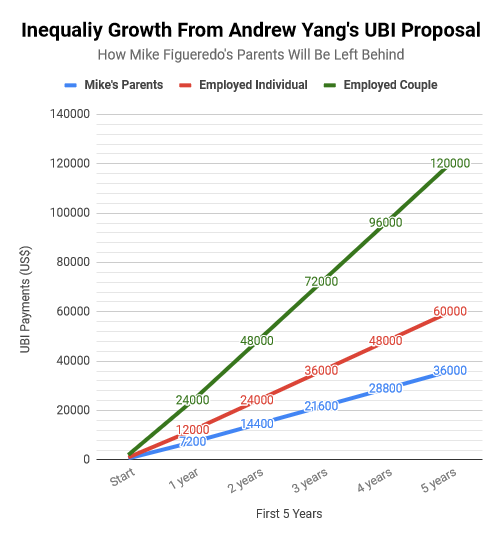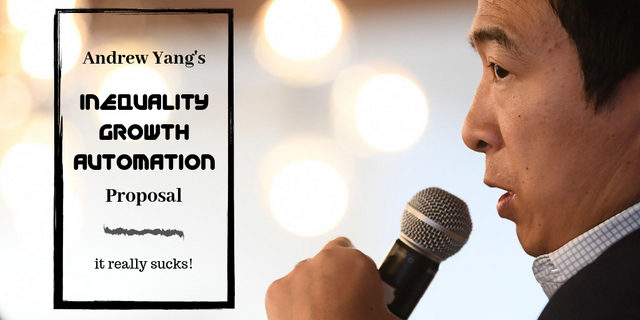Andrew Yang's Triple Whammy of Inequality Growth (and how to fix it)
The #YangGang are in love with 2020 Presidential candidate Andrew Yang's UBI proposal, which he calls a freedom dividend. However, it's a bit like the love that people had for Daenerys Targaryen - the signs are there that this isn't going to be as great as they'd imagined.
Mike Figueredo interviewed Andrew on The Humanist Report and asked how the freedom dividend works. The answer shocked and infuriated me because it's very obviously going to accelerate inequality growth. See if you can pick up on what the problem is...
<h2>How the Freedom Dividend 'works'</h2>
The general idea is to have the Federal Government give everyone $1,000 each month. More specifically, it would give $1,000 to everyone who chooses to opt in. But why would anyone choose not to opt in for free money?
If you're on welfare, you have to give up your welfare payments in order to receive the $1,000. In the interview, Mike said that his father's welfare is roughly $1,300 per month, so he'd lose $300 if he opted in.
On the other hand, Mike's mother gets roughly $400 each month in welfare, so the freedom dividend would mean that she gets an extra $600. That sounds like something she ought to want, right?
Well, the graph below should help to answer that question. The freedom dividend would mean that Mike's parents get an extra $600 per month between them. Compare that to the extra $1,000 that an individual who isn't on welfare would get. One person gets more than the two of them combined just because that person has a job.
The graph also shows what a couple who are both working would receive. Over time, the gap between what they get and what Mike's parents get grows wider, a bit like the gap between Daenerys and Jon.
The person with the job isn't being asked to give up their entire income so that they can receive the freedom dividend, but people on welfare are. Is that fair?
<h2>The Rich Get Richer and The Poor Get Poorer</h2>
Remember, the title of this article said that there's a triple whammy of inequality growth. I've already written about the second whammy - this is where wealthy elites see that everyone else suddenly has money and, because they want that cash for themselves, they jack up the prices on whatever it is they're selling. If everyone gets an extra $1,000 per month, we'd quickly see the prices going up for renting or purchasing real estate. The rich get richer.
The third whammy comes from the fact that Andrew Yang wants to introduce a value added tax (VAT). If you do a search on Google, you'll find that VAT is a regressive tax - i.e. poor people pay more than rich people as a percentage of their income. The poor get poorer.
<h2>How To Fix Yang's Proposal</h2>
Mike's parents would have been better off by $600 between them. Using my calculator, I can see that this works out as $300 each. How about giving everyone $300 each month, regardless of whether they're on welfare or not? That would eliminate the first whammy of inequality growth.
The second and third whammies can be fixed in one go. Instead of using a horrible, nasty value added tax, Andrew could introduce taxes on the economic rights and privileges that someone has instead of taxing the money they earn or spend. As it's typically the rich elites who hold economic rights and privileges (such as owning the apartment you rent or the patent for the medication you need), this is the most effective way of taxing the rich. Of course, you already know all of this because it's one of the first things I wrote about when I started this blog. If the rich can't get richer from taking your money and if the poor don't get poorer from spending more on the same things they already buy, then you've eliminated the other whammies.
<h2>Conclusion</h2>
In its current form, Andrew Yang's UBI proposal is either the most insidious, well thought-out neoliberal economic policy for enriching elites, or it's the dumbest, least well thought-out feauxgressive policy for appealing to people who want to receive more money without having to think of the consequences.
A UBI is possible, but not without tax reform, and it shouldn't require people to surrender their current incomes.


I like Mervin Wu Chin’s response on Twitter.
https://twitter.com/wumervin/status/1140822609963212800?s=21
Congratulations @penston! You received a personal award!
You can view your badges on your Steem Board and compare to others on the Steem Ranking